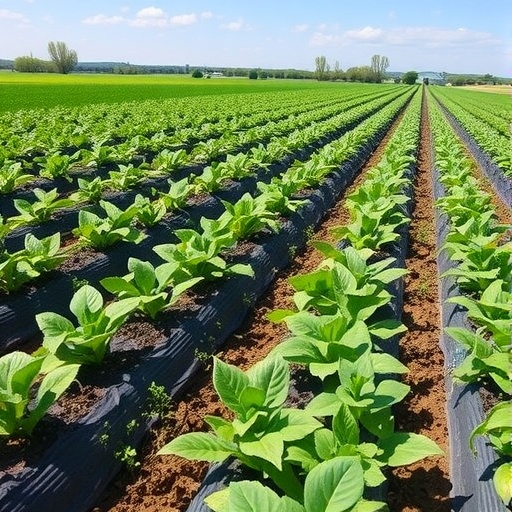In an innovative study published in Discover Agriculture, researchers conducted a comprehensive evaluation of integrated fertilizer applications on the yield of tef (Eragrostis tef) in the Habru district of the eastern Amhara Region. Tef is a cereal grain native to Ethiopia, celebrated for its nutritional value and resilience in arid climates. The study aims to enhance agricultural productivity through sustainable practices, addressing food security challenges in the region.
Through an on-farm evaluation, the researchers adopted a methodical approach by integrating both liquid and inorganic fertilizers. This dual strategy is aimed at optimizing nutrient availability, improving soil quality, and maximizing crop yields. Traditionally, Ethiopian farmers have relied on organic methods, using animal manure and compost, which, while beneficial, often lack the necessary nutrient concentrations for higher yield outputs. This study explores a more synergistic approach that aligns traditional practices with modern agricultural science.
The researchers conducted field trials to assess the impact of various fertilization treatments on tef growth parameters, including plant height, biomass, and ultimately the grain yield. These trials were carefully monitored and recorded across multiple growing seasons to ensure the validity and reliability of the results. The integration of liquid fertilizers—often comprised of essential nutrients in more readily available forms—promises faster uptake by the plants, potentially leading to increased productivity.
In their findings, the research team highlighted the importance of optimizing fertilizer application rates. Excessive use of inorganic fertilizers can lead to soil degradation and environmental concerns, such as nutrient runoff and water pollution. Therefore, balancing the proportions of liquid versus inorganic fertilizers was central to this study. The results revealed that an integrated approach not only boosted yield but also maintained soil health, thereby reinforcing the long-term sustainability of farming practices in the area.
Furthermore, the study emphasized the role of farmer education in implementing integrated fertilization techniques. While the scientific community may be aware of the benefits of such practices, the communication of these methodologies to local farmers is critical for adoption. By organizing workshops and training sessions, the researchers sought to empower farmers with knowledge about optimal fertilizer use and crop management strategies.
The effects of different fertilizer combinations on tef plants were notably significant. Farmers who implemented the recommended integrated fertilization strategies reported substantial increases in yield compared to traditional practices. This bodes well for combating food insecurity, particularly in a region where agricultural productivity is often hindered by nutrient-poor soils and climate variability.
In addition to increasing crop yields, the researchers discussed potential socio-economic benefits for local communities. Higher productivity could lead to increased income for farmers, which in turn promotes community development, improved livelihoods, and better educational opportunities for children. This study illustrates how targeted agricultural innovations can have far-reaching impacts beyond mere crop yield increases.
Moreover, the implications of this research extend to policy considerations. Governments and agricultural organizations should take note of the benefits stemming from integrated fertilization techniques. Investment in research and extension services that promote innovative practices is essential for realizing food security goals and sustainable development objectives in the region.
The study also called for continued research on the long-term effects of integrated fertilization practices on soil health and crop diversity. While short-term yield increases are promising, it is imperative to understand how these practices affect the broader ecological landscape over time. Future research should focus on monitoring outcomes across multiple growing seasons and in varying climatic conditions to ensure adaptability.
As agriculture grapples with the dual challenges of climate change and a growing population, studies like this underscore the importance of blending traditional knowledge with scientific advancements. The integration of liquid and inorganic fertilizers represents one of many potential solutions for sustainable agricultural practices that enhance food production while safeguarding the environment.
Overall, this research serves as a beacon of hope for struggling farmers in the eastern Amhara Region and could pave the way for agricultural policies that prioritize sustainable resource management. By boosting tef yields and promoting environmentally friendly practices, the local agricultural landscape stands to be transformed, fostering resilience in the face of existing and future challenges.
In conclusion, the on-farm evaluation of integrated fertilizer applications in the Habru district presents vital insights into improving tef cultivation. With increasing recognition of the importance of sustainable practices, this study contributes to the global discourse on food security, agricultural innovation, and environmental stewardship. As more farmers adopt these practices, the potential for creating an agricultural model that supports both productivity and ecological health becomes increasingly feasible.
Subject of Research: Integrated application of liquid and inorganic fertilizers on yield of tef (Eragrostis tef)
Article Title: On farm evaluation of integrated application of liquid and inorganic fertilizers on yield of tef (Eragrostis tef) in Habru district, eastern Amhara Region.
Article References:
Teshome, H., Adissie, S., Degu, A. et al. On farm evaluation of integrated application of liquid and inorganic fertilizers on yield of tef (Eragrostis tef) in Habru district, eastern Amhara Region. Discov Agric 3, 169 (2025). https://doi.org/10.1007/s44279-025-00300-w
Image Credits: AI Generated
DOI: 10.1007/s44279-025-00300-w
Keywords: Tef, Eragrostis tef, integrated fertilization, food security, sustainable agriculture, Amhara Region, Ethiopia, crop yield, liquid fertilizers, inorganic fertilizers.




